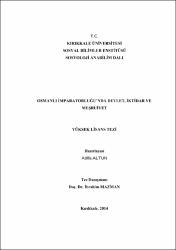Osmanlı İmparatorluğu'nda devlet, iktidar ve meşruiyet
Özet
14. yüzyıl başı itibariyle tarih sahnesine bir beylik olarak çıkan, kısa sürede imparatorluk haline gelen ve altı yüz yıl üç kıtada hüküm süren Osmanlı İmparatorluğu'nun devlet geleneği ve toplum yapısı yıllardır araştırmacılar tarafından irdelenmekte ve bu konuda geleceğe ışık tutacak bilgiler içeren nitelikte birçok eser yazılmaktadır. Bu bilgiler her zaman siyaset, eğitim, ekonomi ve genel itibariyle toplum yapısı açısından altın değerinde olup, sadece Türkiye Cumhuriyeti'nin değil diğer ülkelerin de ilgisini çekmektedir. Biz de bu tezimizde tarih, sosyoloji ve siyaset üçgeninde literatür taraması niteliğinde bir çalışma yaparak, Osmanlı İmparatorluğu'nun siyasi politikaları, devlet geleneği ve toplum yapısı üzerine çalışmayı uygun gördük. Özellikle de devlet geleneği sergilenirken kullanılan meşruiyet kaynaklarının neler olduğunu ve bu kaynakların toplum açısından etkilerini incelemeye çalıştık. Geleneksel ve modern meşru kaynaklarının hemen hemen hepsine tanık olduğumuz bu siyasi düzen içerisinde din ağırlıklı bir otorite tipinden modern meşruiyet kaynağı olarak toplum sözleşmesine doğru bir evrim gerçekleştiğine tanık olmaktayız. Ottomans appeared in the 14th century, became an empire in a short time and reigned in three continents for six centuries. The state tradition and social structure of the Ottoman Empire have been studied by researchers and several works have been written on this subject. This information is always invaluable in terms of politics, education, economics and society in general, and not only Turkish Republic but also other countries are interested in this Empire. In this thesis we did a literature search on the policy, state tradition and social structure of the Ottoman Empire on the basis of history, sociology and politics. Especially, we tried to find out the legitimacy sources for this state tradition and their effects in terms of society. We witness all of the traditional and modern legitimacy sources in this political regime, and we observe an evolution from religious authority to a social contract as a modern legitimacy source.
















